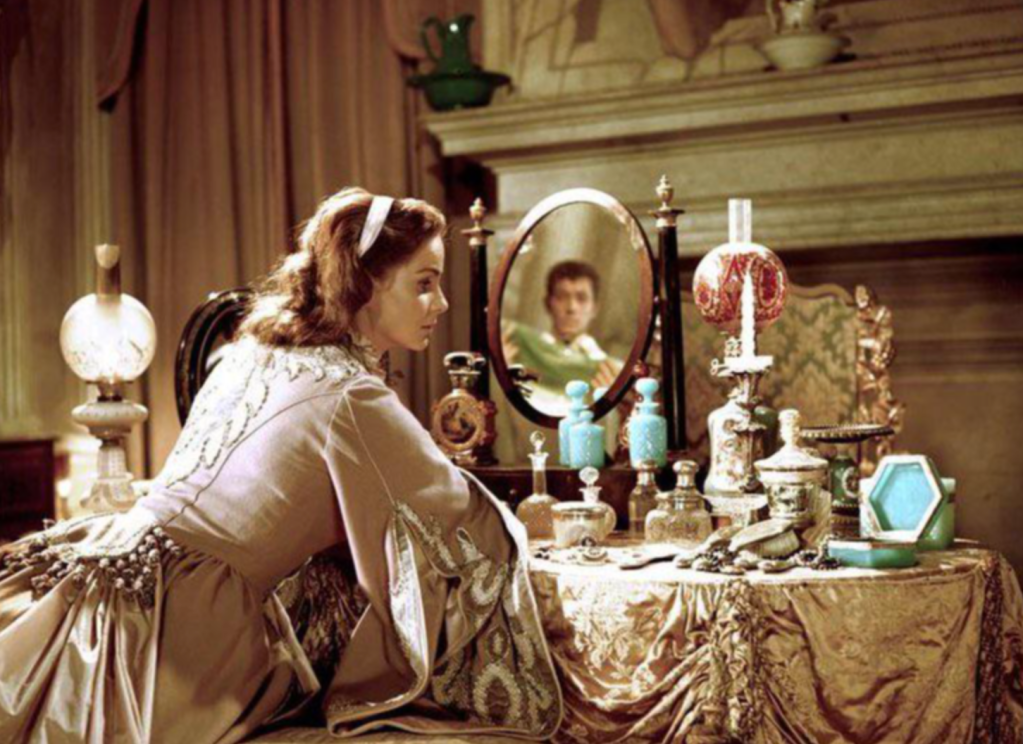Teatro San Benedetto, a Venetian opera house, opened in 1755. It burned down in 1774 and rose from the ashes in 1792 as the Teatro La Fenice; then it again burned down before reopening in 1836. The cycle started once more in 1996 when an arsonist torched it; one wonders, naturally, whether the 2004 rebuild will last.
We meet Senso’s key characters in La Fenice’s expansive bowels 30 years after its second reopening. They all, in contrast to the impressive endurability of the building they’re spending an evening in, will not be afforded the virtues of a second chance. They are Italian countess Livia (Alida Valli), her activist cousin Roberto (Massimo Girotti), and Austrian lieutenant Franz (Farley Granger). The show they’re all watching is interrupted by a protest Roberto has organized to oppose Austria’s recent occupation of the city. Roberto is exiled; though she knows Franz is responsible for her cousin’s punishment, Livia wills herself to overlook it, smitten with the lieutenant after she meets him and they spend an evening together wandering the dank Venetian streets.
Released the penultimate night of 1954, Senso is not a straightforward tragic melodrama, its romance doomed purely by its lovers’ opposing worlds. It’s too one-sided for that. Livia is thrilled by Franz — his youth, his sexual vitality — and the new feelings of possibility he poses in a life where she thought she’d forever be confined to her claustrophobic marriage to an aristocrat (Heinz Moog). Franz, meanwhile, loves Livia less than the money and status she provides him. The more he absorbs both, the less willing he is first to meet up for the trysts by which Livia seems to live, then to respond to the letters into which she pours her heart. Those depletions feel alluded to by the film’s palatial settings, which, though beautifully opulent, are showing signs of decay, evoking not just Franz’s draining of Livia but also the looming fadeout of nobility in Italy, which would cease to be recognized not even a century later with the establishment of the Italian Republic.

Alida Valli and Farley Granger in Senso.
Abandoning the neorealistic sensibility with which he started his career, director Luchino Visconti envisioned neither Valli nor Granger for the roles they would eventually play. For Livia, he thought titans like Ingrid Bergman or Maria Callas, for Franz Marlon Brando. But the people he had to settle for are, to my eye, more apt. Valli’s angular beauty and roiling acting style suit the madness to emerge — the wild eyes and increasing pallidness that suggest that her obsession with Franz is actually killing her.
Granger’s slight physicality and sexual ambiguity lend themselves well to the character’s slipperiness, his way of falling short of the romantic hero-dom he at one point openly cops to. (That you can still see remnants of the blonde Visconti tried to dye his hair with is a blip that unintentionally reinforces the idea that the “real” Franz — the man Livia obfuscates so that she can better see her fantasy — will emerge, true colors and all, when the center of her romantic delusions can no longer hold.)
Senso is interrupted near its end by some battle scenes meant to further illustrate the context in which its unbalanced romance is taking place: the Italian-Austrian war of unification. They are, for what it’s worth, convincingly shot and staged. But they didn’t strike me as unnecessary — a gratuitous break from the cocoon of illusion in which Livia continues to nest until there is no more room. She will not break out of it renewed and beautiful, and not without force. It can be hard to accept the fragility of fantasy. Devastatingly, tragically, Senso pushes it to its limits.
